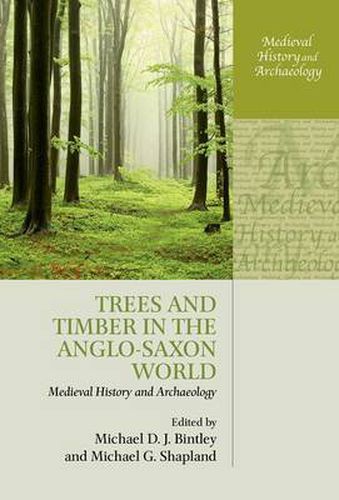Readings Newsletter
Become a Readings Member to make your shopping experience even easier.
Sign in or sign up for free!
You’re not far away from qualifying for FREE standard shipping within Australia
You’ve qualified for FREE standard shipping within Australia
The cart is loading…






Trees were of fundamental importance in Anglo-Saxon society. Anglo-Saxons dwelt in timber houses, relied on woodland as an economic resource, and created a material culture of wood which was at least as meaningfully-imbued, and vastly more prevalent, than the sculpture and metalwork with which we associate them today. Trees held a central place in Anglo-Saxon belief systems, which carried into the Christian period, not least in the figure of the cross itself. Despite this, the transience of trees and timber in comparison to metal and stone has meant that the subject has received comparatively little attention from scholars. Trees and Timber in the Anglo-Saxon World constitutes the very first collection of essays written about the role of trees in early medieval England, bringing together established specialists and new voices to present an interdisciplinary insight into the complex relationship between the early English and their woodlands. The woodlands of England were not only deeply rooted in every aspect of Anglo-Saxon material culture, as a source of heat and light, food and drink, wood and timber for the construction of tools, weapons, and materials, but also in their spiritual life, symbolic vocabulary, and sense of connection to their beliefs and heritage. These essays do not merely focus on practicalities, such as carpentry techniques and the extent of woodland coverage, but rather explore the place of trees and timber in the intellectual lives of the early medieval inhabitants of England, using evidence from archaeology, place-names, landscapes, and written sources.
$9.00 standard shipping within Australia
FREE standard shipping within Australia for orders over $100.00
Express & International shipping calculated at checkout
Trees were of fundamental importance in Anglo-Saxon society. Anglo-Saxons dwelt in timber houses, relied on woodland as an economic resource, and created a material culture of wood which was at least as meaningfully-imbued, and vastly more prevalent, than the sculpture and metalwork with which we associate them today. Trees held a central place in Anglo-Saxon belief systems, which carried into the Christian period, not least in the figure of the cross itself. Despite this, the transience of trees and timber in comparison to metal and stone has meant that the subject has received comparatively little attention from scholars. Trees and Timber in the Anglo-Saxon World constitutes the very first collection of essays written about the role of trees in early medieval England, bringing together established specialists and new voices to present an interdisciplinary insight into the complex relationship between the early English and their woodlands. The woodlands of England were not only deeply rooted in every aspect of Anglo-Saxon material culture, as a source of heat and light, food and drink, wood and timber for the construction of tools, weapons, and materials, but also in their spiritual life, symbolic vocabulary, and sense of connection to their beliefs and heritage. These essays do not merely focus on practicalities, such as carpentry techniques and the extent of woodland coverage, but rather explore the place of trees and timber in the intellectual lives of the early medieval inhabitants of England, using evidence from archaeology, place-names, landscapes, and written sources.